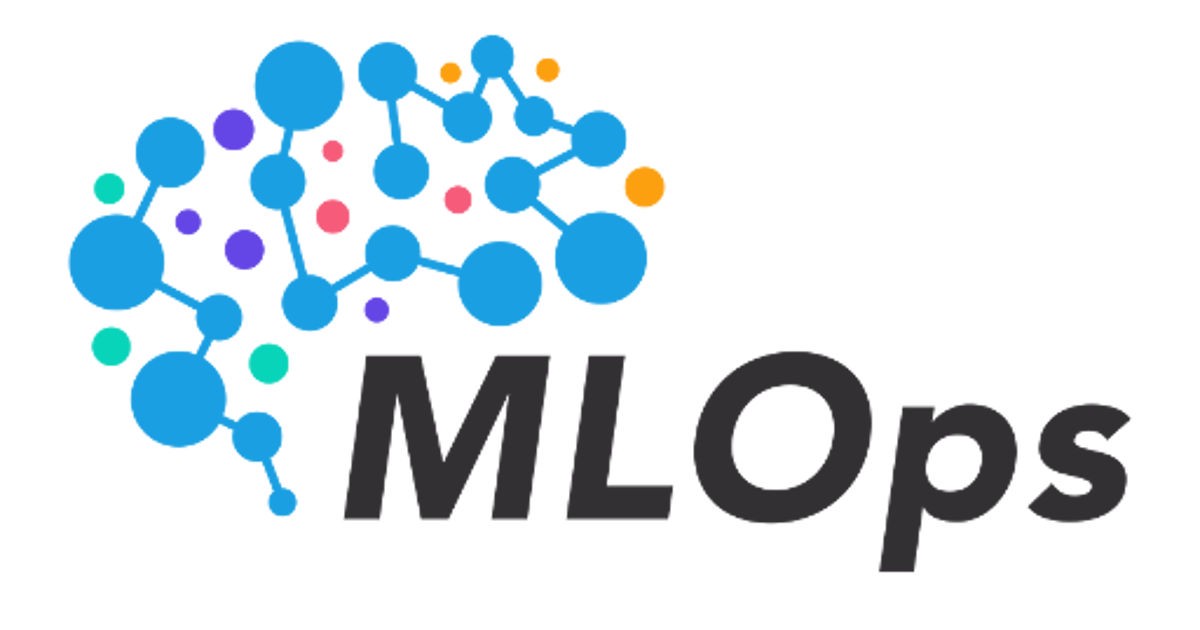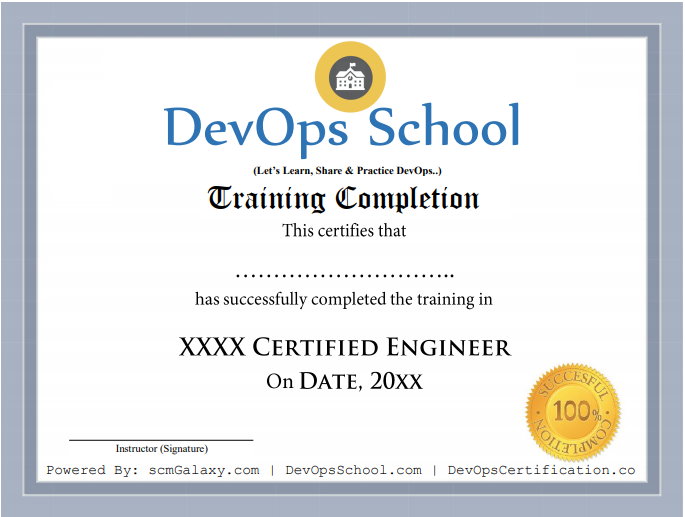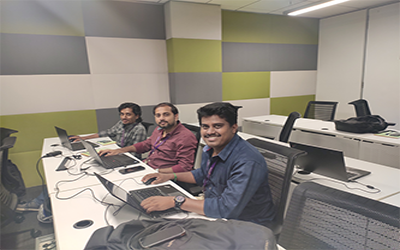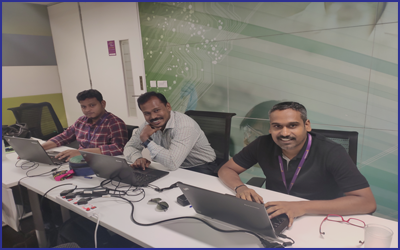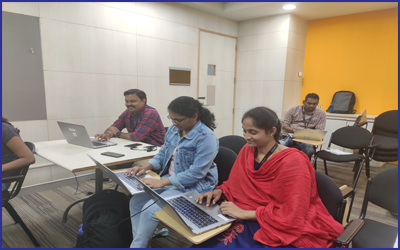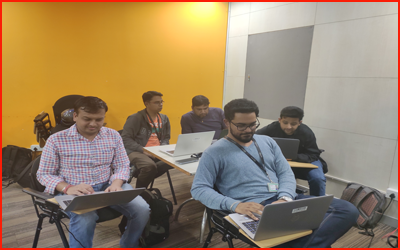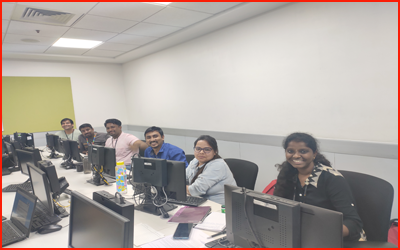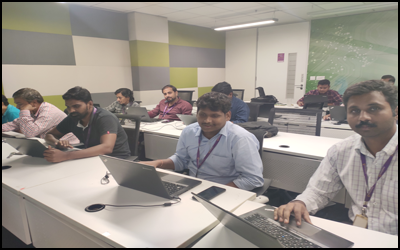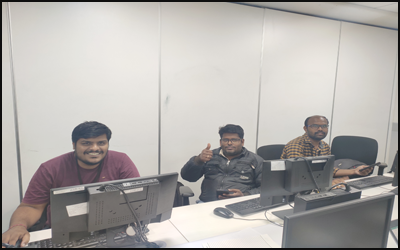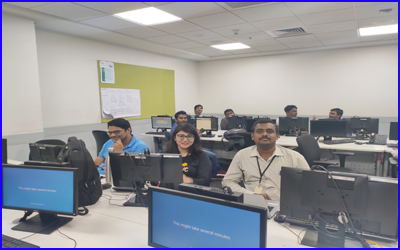MLOps Foundation Certification
Course Duration
5 Days
Live Projects
NA
Certification
Industry recognized
Training Format
8000+
Certified Learners
15+
Years Avg. faculty experience
40+
Happy Clients
4.5/5.0
Average class rating
What is MLOps Foundation Certification?
The MLOps Foundation Certification is an industry-recognized credential designed to equip professionals with the essential knowledge and skills needed to implement MLOps (Machine Learning Operations) practices. MLOps is a collaborative approach to managing and automating the lifecycle of machine learning (ML) models, from development and deployment to monitoring and maintenance. By integrating machine learning with DevOps principles, MLOps ensures that ML models are deployed, monitored, and updated efficiently and at scale, aligning the models with the needs of the business while ensuring quality, reproducibility, and accountability.
The MLOps Foundation Certification focuses on the foundational concepts of MLOps and provides participants with the tools necessary to apply these practices effectively within organizations. The certification covers a variety of topics, including data versioning, model deployment, model monitoring, automation of model pipelines, model governance, and ensuring model performance over time. It is designed for individuals who wish to improve their understanding of MLOps and leverage this knowledge to streamline machine learning workflows, reduce model deployment risks, and improve overall model efficiency.
With machine learning becoming an integral part of business operations, professionals skilled in MLOps are in high demand. The MLOps Foundation Certification is ideal for those seeking to specialize in ML model management and automation, providing them with the necessary expertise to advance in the rapidly growing field of AI and machine learning operations.
Why MLOps Foundation Certification is important
The MLOps Foundation Certification holds significant importance for both individuals and organizations, given the expanding use of machine learning models in real-world applications. Here are several reasons why obtaining the certification is essential:
-
Growing Demand for MLOps Skills: As more companies integrate machine learning into their operations, there is a growing need for professionals who understand how to deploy, monitor, and maintain these models efficiently. MLOps enables organizations to scale their ML operations and streamline the deployment process, making it an indispensable practice in AI-driven industries. Professionals certified in MLOps are well-positioned to lead these initiatives and enhance the reliability of ML applications.
-
Improving Model Deployment and Performance: MLOps promotes continuous integration and continuous delivery (CI/CD) principles in the machine learning lifecycle. By automating the deployment, testing, and monitoring of ML models, MLOps reduces the complexity of maintaining models and ensures they remain operational and high-performing. The MLOps Foundation Certification ensures that professionals are equipped to apply these practices, making model deployment smoother and less error-prone.
-
Operationalizing Machine Learning: The certification helps professionals understand how to convert machine learning models from research prototypes to production-ready applications. MLOps addresses challenges such as model versioning, training pipeline automation, and model governance, ensuring that organizations can deliver consistent, accurate, and reproducible ML models. This operationalization of ML helps companies realize the full potential of AI.
-
Collaboration between Data Science and Operations: MLOps bridges the gap between data science teams (who build models) and operations teams (who manage the deployment and scaling of these models). MLOps enables these teams to collaborate seamlessly, ensuring that models are not only accurate but also reliable and scalable. By acquiring this certification, professionals can improve cross-team collaboration, which is vital for organizations looking to scale their AI initiatives.
-
Ensuring Compliance and Governance: As machine learning models become more integral to business processes, ensuring that they are deployed and maintained in a compliant manner is critical. MLOps involves monitoring model drift, auditing model performance, and ensuring that models comply with data privacy and security regulations. The MLOps Foundation Certification provides professionals with the tools to ensure compliance and model governance.
-
Cost Efficiency and Risk Mitigation: By automating model deployment, testing, and monitoring, MLOps reduces the time and resources required to maintain machine learning models. Additionally, it mitigates risks associated with model failure, such as business disruptions and compliance issues, making MLOps an essential practice for companies that depend on machine learning for mission-critical tasks.
-
Career Growth: As the demand for MLOps professionals continues to rise, the MLOps Foundation Certification enhances career prospects for data scientists, machine learning engineers, and DevOps professionals. It offers an excellent opportunity to gain a specialized skill set and advance in the rapidly growing field of machine learning operations.
Course Feature
The MLOps Foundation Certification Course is designed to provide participants with a deep understanding of MLOps principles and practices. The course focuses on how to manage the full lifecycle of machine learning models, from development and deployment to monitoring and governance. Some of the key features of the course include:
-
Comprehensive Curriculum: The course covers essential topics such as model versioning, model deployment automation, CI/CD pipelines for machine learning, monitoring model performance, and model governance. The curriculum also delves into tools and technologies used in MLOps, including Kubeflow, TensorFlow Extended (TFX), MLflow, and cloud-native platforms for deploying machine learning models at scale.
-
Hands-On Labs and Exercises: To ensure participants are not only learning theory but also gaining practical experience, the course includes hands-on labs and exercises where learners can apply MLOps concepts using real-world tools and platforms. These labs simulate real-world scenarios, allowing participants to experiment with model deployment, versioning, and monitoring.
-
Use of Industry-Standard Tools: Participants will gain experience with popular MLOps tools like Docker, Kubernetes, Terraform, and MLflow. These tools are essential for automating workflows, managing infrastructure, and deploying machine learning models in production.
-
Real-World Case Studies: The course includes case studies of organizations that have successfully implemented MLOps to streamline their machine learning operations. These case studies provide valuable insights into the challenges and best practices associated with scaling ML models in production environments.
-
Certification Exam Preparation: The course is structured to ensure that participants are fully prepared for the MLOps Foundation Certification exam. It includes quizzes, mock exams, and practice questions to help learners assess their understanding of the material and prepare for the final certification exam.
-
Flexible Learning Options: The course offers flexible learning formats, including instructor-led sessions and self-paced online modules. This flexibility allows participants to learn at their own pace while still having access to expert instructors for questions and guidance.
-
Global Recognition: The MLOps Foundation Certification is recognized globally across the machine learning and AI industries. Holding this certification demonstrates that a professional has the skills necessary to effectively manage and deploy machine learning models, making it a valuable credential for career growth.
Training objectives
The MLOps Foundation Certification course has several key training objectives that participants will achieve by the end of the course:
-
Understanding MLOps Principles: Participants will gain an understanding of MLOps as a practice and how it integrates the operational aspects of machine learning with development and deployment processes. The course will highlight how MLOps differs from traditional machine learning approaches and how it ensures the efficient management of ML models.
-
Automating ML Workflows: Learners will understand how to automate machine learning workflows, including model training, deployment, and monitoring. This includes creating CI/CD pipelines for ML models and automating data preprocessing, model training, and evaluation processes.
-
Deploying Models at Scale: The course will cover techniques for deploying machine learning models at scale, using platforms like Kubernetes and cloud services. Participants will learn about deploying models in various environments, including on-premises, hybrid, and cloud-based infrastructures.
-
Monitoring and Maintaining Models: Participants will learn how to monitor model performance over time, detect model drift, and implement automated retraining workflows. They will also learn how to collect and analyze feedback from production environments to ensure that models remain accurate and up to date.
-
Model Versioning and Reproducibility: A key part of MLOps is ensuring that models are reproducible and that changes to models are versioned properly. The course will teach how to use tools for model versioning, tracking experiments, and ensuring that models can be replicated and tested across different environments.
-
Ensuring Compliance and Governance: The course will address the importance of model governance, including tracking model performance, ensuring compliance with regulations (such as GDPR), and implementing best practices for auditing and validating models.
-
Collaborating Between Teams: MLOps is built around fostering collaboration between data scientists, developers, and operations teams. The course will teach participants how to implement MLOps practices that streamline communication and coordination between these teams to improve the overall efficiency of machine learning workflows.
Target Audience
The DevSecOps Foundation Certification is designed for professionals who want to understand how security integrates with DevOps processes. The target audience includes:
-
DevOps Engineers: Professionals working in DevOps who want to gain a deeper understanding of how to incorporate security into their DevOps practices.
-
Security Engineers: Cybersecurity professionals who want to learn how to work with DevOps teams to ensure that security is embedded throughout the development lifecycle.
-
Software Developers: Developers who want to learn how to write secure code and ensure that their applications meet security requirements from the start.
-
IT Operations Professionals: IT professionals working in operations who are responsible for managing cloud environments and applications and need to understand how to secure these systems.
-
Cloud Engineers: Cloud professionals who want to ensure that their cloud infrastructure is secure by integrating DevSecOps practices into their cloud environments.
-
Compliance and Risk Managers: Professionals in charge of ensuring that their organizations comply with regulatory standards and who need to understand how to embed compliance checks into the DevOps process.
-
Aspiring DevSecOps Professionals: Individuals looking to transition into a DevSecOps role or those interested in learning about secure development practices within a DevOps pipeline.
Training Methodology
The MLOps Foundation Certification course employs a combination of theoretical learning, practical experience, and hands-on labs to ensure participants gain a comprehensive understanding of MLOps. The training methodology includes:
-
Instructor-Led Sessions: Expert instructors lead live sessions that explain core concepts and best practices, providing opportunities for interactive discussions.
-
Hands-On Labs: The course includes practical labs where learners can apply their knowledge by working with MLOps tools and technologies in real-world scenarios.
-
Quizzes and Assessments: Regular quizzes and assessments throughout the course help reinforce learning and ensure participants are ready for the certification exam.
-
Interactive Discussions and Case Studies: The course encourages discussions and learning from real-world case studies to understand the challenges and successes of MLOps implementations in different organizations.
Training Materials
Participants will receive a range of training materials to support their learning:
-
Course Slides and Notes: Detailed slides and notes covering key concepts, best practices, and MLOps tools and techniques.
-
Hands-On Labs: Access to cloud environments and tools used in MLOps to practice deployment, monitoring, and scaling models.
-
Mock Exams and Practice Questions: Practice exams and mock questions to help learners assess their readiness for the certification exam.
-
Instructor Support: Continuous access to instructors for clarifications, questions, and additional guidance.
Instructor-led, Live & Interactive Sessions
DURATION |
MODE |
LEVEL |
BATCHES |
COURSE PRICE AT |
|---|---|---|---|---|
5 Days |
Corporate (Online/Classroom) |
MLOps Foundation Certification |
Corporate Batch |
Contact US |
How to contact DevOpsSchool :
+1 (469) 756-6329
Contact@DevopsSchool.com
DevopsSchool.com
+91 99057 40781
AGENDA : MLOPS FOUNDATION CERTIFICATION Download Curriculum
SL |
Method of Training and Assesement |
% of Weightage |
|---|---|---|
1 |
Understanding the problems |
5% |
2 |
Concept Discussion |
10% |
3 |
Demo |
25% |
4 |
Lab & Exercise |
50% |
5 |
Assessments & Projects |
10% |
OUR COURSE IN COMPARISON
| FEATURES | DEVOPSSCHOOL | OTHERS |
|---|---|---|
| Lifetime Technical Support | ||
| Lifetime LMS access | ||
| Interview-kit | ||
| Step by Step Web Based Tutorials | ||
| Training Slides |
- Students should have Adobe Photoshop installed on their computers to follow along.
- You are a video creator
- You might know how to edit with Final Cut, iMovie, Sony Vegas, Premiere Elements, Windows Movie Maker, Camtasia, Screenflow, etc. But you want to transition to editing with Photoshop.
- You are a complete beginner who has never opened Photoshop
- You have played around with Photoshop, but need some help becoming a more efficient editor.
Weekdays - Live Class Schedule
| Day | IST (India) | PST (USA) | EST (USA) | CET (Europe) | JST (East Asia) |
|---|---|---|---|---|---|
| Monday | 9:00 PM - 11:00 PM | 7:30 AM - 9:30 AM | 10:30 AM - 12:30 PM | 4:30 PM - 6:30 PM | 12:30 AM - 2:30 AM (Tuesday) |
| Tuesday | 9:00 PM - 11:00 PM | 7:30 AM - 9:30 AM | 10:30 AM - 12:30 PM | 4:30 PM - 6:30 PM | 12:30 AM - 2:30 AM (Wednesday) |
| Wednesday | 9:00 PM - 11:00 PM | 7:30 AM - 9:30 AM | 10:30 AM - 12:30 PM | 4:30 PM - 6:30 PM | 12:30 AM - 2:30 AM (Thursday) |
| Thursday | 9:00 PM - 11:00 PM | 7:30 AM - 9:30 AM | 10:30 AM - 12:30 PM | 4:30 PM - 6:30 PM | 12:30 AM - 2:30 AM (Friday) |
Weekends - Live Class Schedule
| Day | IST (India) | PST (USA) | EST (USA) | CET (Europe) | JST (Asia) |
|---|---|---|---|---|---|
| Friday | 9:00 AM - 11:00 AM | 7:30 PM - 9:30 PM (Thursday) | 10:30 PM - 12:30 AM (Thursday/Friday) | 4:30 AM - 6:30 AM (Friday) | 1:30 PM - 3:30 PM (Friday) |
| Saturday | 9:00 AM - 11:00 AM | 7:30 PM - 9:30 PM (Friday) | 10:30 PM - 12:30 AM (Friday/Saturday) | 4:30 AM - 6:30 AM (Saturday) | 1:30 PM - 3:30 PM (Saturday) |
| Sunday | 9:00 AM - 11:00 AM | 7:30 PM - 9:30 PM (Saturday) | 10:30 PM - 12:30 AM (Saturday/Sunday) | 4:30 AM - 6:30 AM (Sunday) | 1:30 PM - 3:30 PM (Sunday) |
MLOPS CERTIFICATION
What are the benefits of MLOps Foundation Certification?
Certifications always play an important role in any profession. It is considered as one of the best way to determine one’s credibility and worth in the professional career. The same thing is applicable in DevOps, if you are a certified SRE professional then you will get certain benefits:
- MLOps Foundation Certification assure recruiters that the SRE professional whom we are going to hire have the skills, knowledge, and competency to perform the responsibilities what expected from them after hiring.
- SRE as a technology is dominating the job market. SRE engineer ranks #2 on Glassdoor's best jobs rankings. The role of SRE certified professional has seen a 200% jump in postings on indeed" according to SD times report
- This certified course helps anyone who aspires to make a career as a SRE professional.
- SRE Certified Engineer is one of the most highly paid job roles in the world. Pay scale even for junior level SRE practitioner is quite high.
- According to indeed and other job portals, 80% of the companies pay more than $90000 starting salary to a SRE Certified Professionals. Also, 35% pay at least $115000 and 17% more than $125000
- Obviously there are several factors which affects salary for like geography, skills, company, it varies accordingly. In Cities like Bangalore/Hyderabad SRE Certified Professional can expect - INR 3,25,672 - 19,42,394 which is not at all a bad package.
- SRE is going to stay here for long time. Therefore organizations and as well as professionals need to change as they have no choice but to evolve. If they will evolve then then demands of certified professionals will definitely increase and the sooner you do it, the sooner you will be in a leading position.
View more
FREQUENTLY ASKED QUESTIONS
After the training each participant will get LIFETIME ACCESS of our Learning Management System (LMS) where you will get materials in the form of Class recordings, Notes, PDF slides, Web reference step by step guide, questions and answers, test module, exercise and sample projects.
Yes, All of our training demo and lab would be done in AWS cloud platform where we can save lots of time for setting up the infrastructure for demo and lab. Our trainer also designed the course for quick learning and grasping method.
Yes, Snacks and Lunch would be served at training venue free of cost from our end.
Yes, we have DevOpsSchool forum. After the training you may post your issues and Instructors would reply you within 24 hours.
After successful completion of our SRE workshop in Bangalore, every participants would be awarded with SRE certificates approved by DevOpsSchool and DevOpsCertification.co Certification program which is industry recognized and does holds high value.
Once you make the payment based on the given instructions, you will receive the joining KIT within 12 hours.
ONLINE TRAINING REVIEWS

Abhinav Gupta, Pune
(5.0)The training was very useful and interactive. Rajesh helped develop the confidence of all.

Indrayani, India
(5.0)Rajesh is very good trainer. Rajesh was able to resolve our queries and question effectively. We really liked the hands-on examples covered during this training program.

Ravi Daur , Noida
(5.0)Good training session about basic SRE concepts. Working session were also good, howeverproper query resolution was sometimes missed, maybe due to time constraint.

Sumit Kulkarni, Software Engineer
(5.0)Very well organized training, helped a lot to understand the SRE concept and detailed related to various tools.Very helpful

Vinayakumar, Project Manager, Bangalore
(5.0)Thanks Rajesh, Training was good, Appreciate the knowledge you poses and displayed in the training.

Abhinav Gupta, Pune
(5.0)The training with DevOpsSchool was a good experience. Rajesh was very helping and clear with concepts. The only suggestion is to improve the course content.
